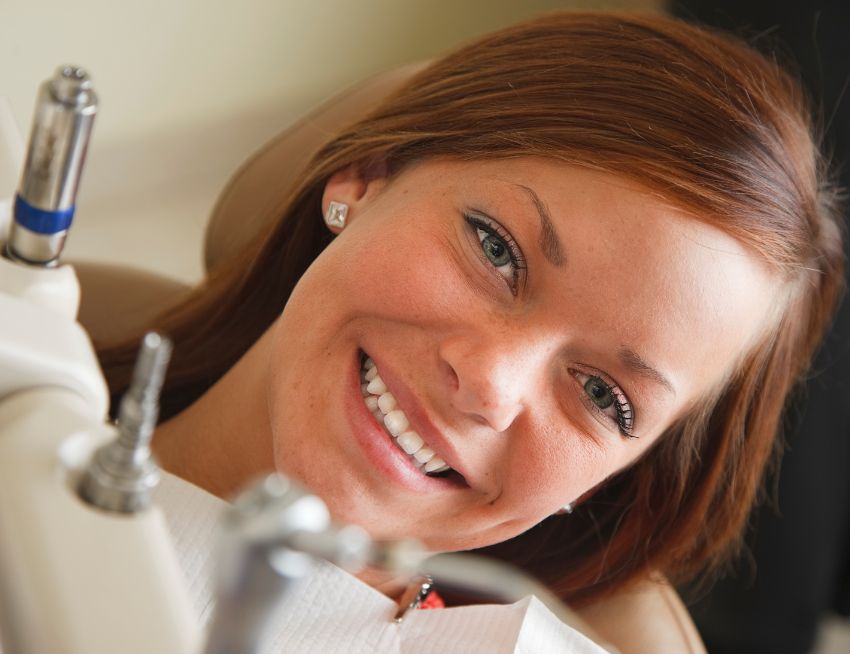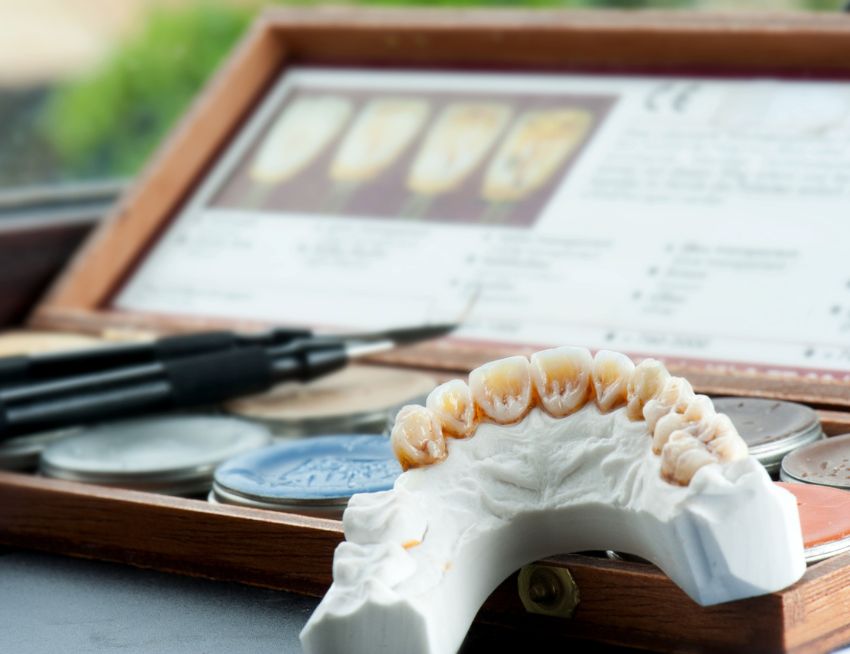Patients from across the globe, including those in the United States, are coming to our Budapest-based dental clinic for the highest quality and most affordable dental care. To help in the complex process of selecting dental crown materials, our comprehensive guide provides a wealth of information on the various types of crowns, optimal materials to choose, and critical factors to consider.
At our clinic, we strive to equip our patients with the knowledge needed to maintain a beautiful and healthy smile for years to come. To that end, we seek to demystify the crown selection process by answering frequently asked questions and providing tips for taking care of them.
Our ultimate goal is to help our patients make informed decisions regarding their dental health while cognizant of the lifespan and cost of dental crowns.
So let’s get started!

How dental crowns can restore your smile and oral health
Dental crowns are a popular tooth restoration treatment that can help to improve both the appearance and function of damaged or decayed teeth.
Essentially, a dental crown is a cap or covering that is placed over a damaged tooth to restore its shape, size, strength, and appearance. Crowns can be made from a variety of materials, including metals, porcelain, ceramic, and zirconia, each with their own unique advantages and disadvantages.
Dental crowns are an invaluable tool in the restoration of fractured, decayed, or weakened teeth, as well as to improve the appearance of teeth that are misshapen, discoloured, or have other cosmetic issues. In situations where the damage is too severe for a filling, such as after a root canal procedure, a crown can provide a stable protective layer that shields the dentin from further harm.

Why do people need dental crowns?
At our dental clinic in Hungary, we understand that many people have questions about dental crowns. You might be wondering, why do people need dental crowns in the first place? Well, there are a few different reasons.
One common scenario is when a tooth has become weakened due to decay or damage. In these cases, a dental crown can help to restore the tooth’s structure and function and protect it from further harm. Additionally, dental crowns can be used to cover teeth that have been discolored or misshapen, improving the appearance of your smile.
Another reason why dental crowns might be necessary is to support other dental work, such as bridges or implants. Crowns can help to anchor these devices in place and provide a stable, long-lasting solution for missing teeth.
At our clinic, we offer a variety of dental crown materials to choose from, so you can find the perfect fit for your needs and budget. From porcelain to metal to zirconia, each material has its own set of advantages and disadvantages. Our experienced team will be happy to walk you through the options and help you make an informed decision.
dental crown materials
When it comes to capping your teeth, there are a few different crown materials to choose from. Each material has its own set of advantages and disadvantages, so it’s important to understand your options before making a decision.
Pros and cons of metal crowns
Advantages and disadvantages of porcelain crowns
Porcelain crowns are the perfect solution if you’re looking for a natural looking tooth alternative as they’re easily customisable to match the shade and shape of your surrounding teeth.
However, due to their brittleness, they may be prone to chipping or cracking, making them a less reliable choice depending on where they are situated in the mouth.
They are a great choice for front teeth or other visible areas of the mouth.

Benefits and drawbacks of ceramic crowns
Ceramic crowns, categorized as a more resistant material in comparison to porcelain crowns, may be recommended for individuals who suffer from allergies or sensitivities to other materials.
But, even though it is more resistant to wear and tear than porcelain crowns, these crowns may prove to be weaker than some other options.
Strengths and weaknesses of zirconia crowns
Zirconia crowns are a newer choice in dental crowns, combining strength, durability, and a natural aesthetic. These crowns are made from a ceramic that has been reinforced with zirconia, creating an excellent resistance to cracking and chipping.
Aside from being a more costly option, zirconia crowns may not be suitable for every patient. However, with careful consideration, this cutting-edge option may provide a perfectly pleasing and enduring solution.
At our dental clinic, we’re happy to discuss the pros and cons of each type of crown material with you, and help you make an informed decision about the best choice for your individual needs. Click here to check the highest-quality dental crowns our clinic offers.
Best materials for dental crowns
Choosing the right material for your dental crown is an important decision, as it can impact the durability, appearance, and overall success of your restoration. While there’s no one-size-fits-all answer when it comes to the “best” material for dental crowns, there are a few options that tend to be recommended more often than others. Let’s see the dental crown materials in detail.
Choosing the right crown material – dental crown materials
One of the most popular materials for dental crowns is porcelain. This material is highly customizable, as it can be shaded to match the color of your natural teeth and sculpted to mimic their shape. Porcelain crowns are also highly durable, and they typically last for 10-15 years or more with proper care.
Zirconia crowns are a popular and long-lasting option for dental restoration. With great strength and an impressive resistance to damage, these crowns are ideal for tougher force chewing and biting.
But they are more than just resilient, as they are also biocompatible – meaning that there is little worry for allergic reactions or irritation.
However, metal crowns are often the go-to for those who require a great amount of durability.
Gold and other metal alloys are resistant to wear and tear, yet some patients may not prefer the metallic gleam of these crowns – or may even be allergic to them. With proper care, these metal crowns can last for many years.
Factors to consider when selecting a crown material
Choosing the right material for your dental crown can be a complex decision, as there are a variety of factors to consider. When selecting a crown material, it’s important to take into account the following:
Appearance
One of the most important factors to consider is the appearance of the crown. Depending on the location of the tooth being restored, you may want a crown that closely matches the color and shape of your natural teeth. In this case, porcelain or ceramic crowns may be the best choice.
Durability
The durability of the crown is also an important consideration, as you want a restoration that can withstand the forces of biting and chewing without cracking or breaking. Zirconia and metal crowns are highly durable, making them a good option for patients who need a long-lasting restoration.
Biocompatibility
For some patients, biocompatibility may be a concern. This is especially true for people with metal allergies or sensitivities. In this case, porcelain, ceramic, or zirconia crowns may be a better choice than metal crowns.
Cost
Finally, cost is an important consideration for many patients. Depending on your budget, some crown materials may be more affordable than others. Porcelain and ceramic crowns tend to be more expensive than metal or zirconia crowns, but they may be a worthwhile investment for patients who prioritize aesthetics.

How to discuss options with your dentist
When it comes to choosing the right dental crown material, it’s important to have an open and honest discussion with your dentist. Your dentist can help you weigh the pros and cons of different materials, and recommend the best option based on your individual needs and preferences. Here are a few tips for discussing your options with your dentist:
- Ask questions: Don’t be afraid to ask your dentist questions about different crown materials. Ask about the pros and cons of each option, as well as the cost and expected lifespan of the restoration.
- Discuss your goals: Talk to your dentist about your goals for the restoration. Do you prioritize aesthetics, or are you more concerned about durability and longevity? By discussing your goals, your dentist can recommend a material that aligns with your priorities.
- Consider your budget: Dental crowns can vary significantly in cost, so it’s important to discuss your budget with your dentist. Your dentist can recommend options that fit within your budget and provide the best value for your investment.
- Discuss any concerns: If you have any concerns or reservations about a particular material, be sure to discuss them with your dentist. Your dentist can help address any concerns and recommend alternative options if necessary.
By working closely with your dentist and having an open and honest discussion about your options, you can make an informed decision about your dental crown material and achieve the best possible outcome for your restoration.
At our dental clinic, we can work with you to determine the best crown material for your individual needs and preferences. We’ll take into account factors like appearance, durability, biocompatibility, and cost to help you make an informed decision about your dental restoration.

Cost of dental crowns in Hungary
The topic of dental crown materials brings up several factors that directly impact pricing.
These influences include, but are not limited to material type, location of clinic as well as complexity level of required restorative works. To help you make an informed decision here is what you can expect from the average prices for some common dental crown materials found in Hungarian dental clinics – including our own:
- Metal Crowns: These represent the most affordable option with costs averaging between $250-$350 per unit.
- Porcelain fused to metal (PFM) Crowns: While it may be slightly more costly than metal options, PFM type is priced approximately between $300 – $450 per unit.
- All Ceramic Crowns: The porcelain- all ceramic types generally have the highest price points ranging from about $500-$700 per unit.
- Zirconia Crowns: Zirconia based crowns are usually a more budget friendly alternative to their porcelain counterparts costing approximately between $400 -$600 per crown.
However its vital for potential patients to keep in mind that these prices provided illustrate averages only, and there may be variation based on specific geographic locations or dental clinics.
Further also the costs could fluctuate stemming from underlying necessary procedures such a root canal treatment or extractions. As Budapest Top Dental clinic–we pledge competitive pricing that is open, honest and fair alongside experienced professionals that are committed to your dental health and creating a beautiful smile.
It’s important to note that these prices are only averages and can vary depending on the dental clinic and location. Additionally, prices may be affected by any additional procedures that may be necessary, such as root canals or extractions.
Conclusion
When dealing with dental crowns, there are a wide range of options available when it comes to material choice. Factors such as durability, aesthetics, and cost must be weighed when making a decision.
Consulting with your dentist is always encouraged to ensure an informed decision tailored to your individual needs. The professionals at Budapest Top Dental have made it their mission to provide top-notch care to patients of all backgrounds.
For U.S. citizens looking for quality treatment and care abroad, our clinic in Hungary beckons to provide service of unbeatable quality. Our team is devoted to delivering excellent care and crafting healthy, gorgeous smiles.
Ultimately, when looking for a solution to dental ailments, crowns can be an ideal option, giving you the perfect opportunity to restore any damaged tooth or enhance the looks of your smile.
Contact us today to learn more about our services and schedule a consultation.


